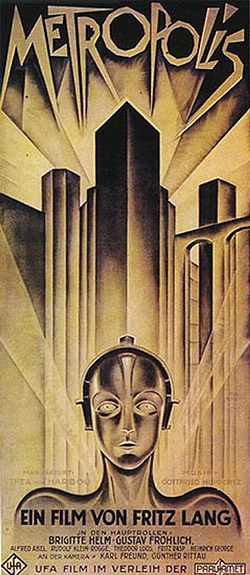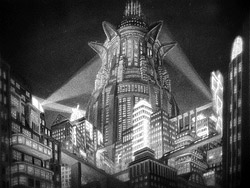
METROPOLIS (MOVIE)
UFA
Original release: January 10th, 1927
Running time: 153 minutes
Director: Fritz Lang
Writers: Thea von Harbou, Fritz Lang
Cast: Alfred Abel, Brigitte Helm, Gustav Fröhlich and Rudolf Klein-Rogge
It’s hard to talk about the Weimar years, expressionism or films which beckoned the sci-fi era without mentioning Metropolis. As a film which emerged from the silent era, heavily fused with political, religious and mystical elements, Metropolis stood out and stood the test of time. It continues to be named as one of the best sci-fi movies of all time and one of the main influences in the sci-fi genre today.
Set in a dystopian future where society is divided between the proletariat, who live and work underground, and the bourgeois, who live above in the towering city in decadence, luxury and excess, Metropolis is ruled by Joh Fredersen’s (Alfred Abel). When his son Feder (Gustav Frölich) falls in love with Maria (Brigitte Helm), the mystical and beautiful teacher who lives below the city, Joh plots to snatch her from him and use her to overthrow the proletariat movement against him.

With the help of mad scientist Rotwang (Rudolf Klein-Rogge), a robot version of Maria is created and let loose on Metropolis, but unknown to Fredersen, Rotwang has own motives.
Shortly after its initial release, Paramount (US) and Ufa (Germany) removed almost a quarter of Lang’s footage without his supervision for subsequent releases when the film received mixed reviews. The original version was almost three hours long and what was cut was thought to have been forever lost. That was until 2008 when one of the most remarkable finds in cinema history took place in a small museum in Buenos Aires.
Several dusty reels of Metropolis footage were discovered containing 25 minutes of footage previously thought to have been lost to the world!
Metropolis Restored and Reconstructed offers a more complete narrative than its previous reconstruction ever did. Characters such as 11811, Feder and Josephat are given more screen time, we see more of Robot Maria’s crazed dancing as she creates havoc among the bourgeois. There’s also more of the fight between Josephat and The Thin Man. These are just a few examples though and the restored scenes are very easy to spot because they are heavily scratched and are in high contrast to the rest of the footage.

Metropolis has the look and feel of a protofascist future with its towering columns, and uniformed styled military precision.
It has been argued by writers such as Siegfried Kracauer and Lotte Eisner that films like Metropolis, along with Das Kabinett des Dr Caligari (1920) and Nosferatu, eine Symphonie des Grauens (1922) foretold the coming of the fascist era and the Third Reich. This is of course nonsense, especially in the case of Frtiz Lang.
Lang often spoke about how impressed Hitler had been with Metropolis and in a conversation with his propaganda minister Joseph Goebbels had been offered the job of official film director for propaganda movies for the Third Reich. Lang turned down the offer and left Germany that very afternoon, in contrast to his wife who joined the Nationalist Socialist Party. The job would eventually go to Leni Riefenstahl.
Leaving the politics of Metropolis aside though, it is a film of remarkable vision, endurance and influence. Think of a futuristic city and no doubt any image you conjure up can be traced back to Metropolis.
Until a complete set of reels is discovered in some Aladdin’s cave, this is the closet we have ever come to seeing the original Metropolis which premiered in Germany in the 1920’s. It’s also as close as we’ll ever get to that wonderful long-gone Weimar time.

About Patrick Samuel

The founder of Static Mass Emporium and one of its Editors in Chief is a composer and music producer with a philosophy degree. Static Mass is where he lives his passion for film and writing about it. A fan of film classics, documentaries and World Cinema, Patrick prefers films with an impeccable way of storytelling that reflect on the human condition.






































































 Please wait...
Please wait...